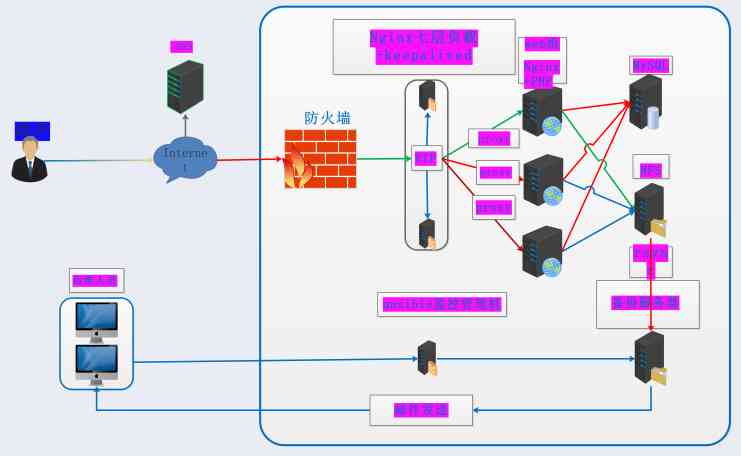Linked list
brief introduction
Array : In the case of index semantics , Using the index to get values , A quick query .
- The ability to access randomly
Linked list : It's not suitable for semantic indexing
- Real dynamics , There's no need to deal with fixed capacity
structure
Build node classes
<?php
declare(strict_types=1);
class Node
{
// The element value of this node
public $e;
// Pointer to the next node
public $next;
public function __construct($e = null, $next = null)
{
$this->e = $e;
$this->next = $next;
}
// Output the element value of the node object as a string
public function __toString(): string
{
return (string)$this->e;
}
}
Build a linked list implementation class
- Define properties and constructors
<?php
declare(strict_types=1);
require_once 'Node.php';
class LinkedList
{
// Chain header pointer
private $head;
// The number of elements in the linked list
private int $size;
public function __construct()
{
$this->head = null;
$this->size = 0;
}
}
- Get the number of effective elements in the linked list
// Get the number of effective elements in the linked list
public function getSize(): int
{
return $this->size;
}
- Judge whether the list is empty
// Is the list empty
public function isEmpty(): bool
{
return $this->size === 0;
}
- Insert an element in the chain header
// Insert an element in the chain header
public function addFrist($e): void
{
// $nodeObj = new Node($e);
// $nodeObj->next = $this->head;
// $this->head = $nodeObj;
$this->head = new Node($e, $this->head);
$this->size++;
}
- In the index Bit insertion element $e
// Go to index Bit to add a new element e
// To assist in understanding and practicing , Suppose the linked list is also indexed
public function add(int $index, $e): void
{
if ($index < 0 || $index > $this->size) {
throw new RuntimeException('index Wrong value ');
}
if ($index === 0) {
$this->addFrist($e);
} else {
$prev = $this->head;
for ($i = 0; $i < $index - 1; $i++) {
$prev = $prev->next;
}
$prev->next = new Node($e, $prev->next);
$this->size++;
}
}
- Insert the element at the end of the list $e
// Insert the element at the end of the filing table $e
public function addLast($e): void
{
$this->add($this->size, $e);
}
- Introduce virtual head node , The logic is the same no matter which node is inserted into the linked list
<?php
declare(strict_types=1);
require_once 'Node.php';
class LinkedList
{
// Chain header pointer
// private $head;
// Virtual head node
private $dummyHead;
// The number of elements in the linked list
private int $size;
public function __construct()
{
// $this->head = null;
$this->dummyHead = new Node(null, null);
$this->size = 0;
}
// Insert an element in the chain header
// public function addFrist($e): void
// {
// // $nodeObj = new Node($e);
// // $nodeObj->next = $this->head;
// // $this->head = $nodeObj;
// $this->head = new Node($e, $this->head);
// $this->size++;
// }
// Go to index Bit to add a new element e
// To assist in understanding and practicing , Suppose the linked list also has an index
// public function add(int $index, $e): void
// {
// if ($index < 0 || $index > $this->size) {
// throw new RuntimeException('index Wrong value ');
// }
// if ($index === 0) {
// $this->addFrist($e);
// } else {
// $prev = $this->head;
// for ($i = 0; $i < $index - 1; $i++) {
// $prev = $prev->next;
// }
// $prev->next = new Node($e, $prev->next);
// $this->size++;
// }
// }
// Go to index Bit to add a new element e
public function add(int $index, $e): void
{
if ($index < 0 || $index > $this->size) {
throw new RuntimeException('index Wrong value ');
}
$prev = $this->dummyHead;
for ($i = 0; $i < $index; $i++) {
$prev = $prev->next;
}
$prev->next = new Node($e, $prev->next);
$this->size++;
}
// Insert the element at the end of the filing table $e
public function addLast($e): void
{
$this->add($this->size, $e);
}
// Insert an element in the chain header
public function addFrist($e): void
{
$this->add(0, $e);
}
}
- Set the first index The value of bit is e
// Set the first index Bit element value
// To assist in understanding and practicing , Suppose the linked list also has an index
public function set(int $index, $e): void
{
if ($index < 0 || $index >= $this->size) {
throw new RuntimeException('index Wrong value ');
}
// Use the next element of the virtual head node as the starting bit
$cur = $this->dummyHead->next;
for ($i = 0; $i < $index; $i++) {
$cur = $cur->next;
}
$cur->e = $e;
}
- Find out if the element exists
// Find out if there are elements in the list $e
public function contains($e): bool
{
// Use the next element of the virtual head node as the starting bit
$cur = $this->dummyHead->next;
while ($cur !== null) {
if ($cur->e === $e) {
return true;
}
$cur = $cur->next;
}
return false;
}
- Remove elements
// Delete the first index Bit element value , And return the deleted element value
// To assist in understanding and practicing , Suppose the linked list also has an index
public function remove(int $index)
{
if ($index < 0 || $index >= $this->size) {
throw new RuntimeException('index Wrong value ');
}
$prev = $this->dummyHead;
for ($i = 0; $i < $index; $i++) {
$prev = $prev->next;
}
$retNode = $prev->next;
$prev->next = $retNode->next;
$retNode->next = null;
$this->size--;
return $retNode->e;
}
// Delete first element
public function removeFrist()
{
return $this->remove(0);
}
// Delete the last element
public function removeLast()
{
return $this->remove($this->size - 1);
}
- Object to string magic method
public function __toString(): string
{
$string = '';
$cur = $this->dummyHead->next;
while ($cur !== null) {
$string .= ($cur . '->');
$cur = $cur->next;
}
$string .= 'NULL
';
return $string;
}
Complete code
<?php
declare(strict_types=1);
require_once 'Node.php';
class LinkedList
{
// Chain header pointer
// private $head;
// Virtual head node
private $dummyHead;
// The number of elements in the linked list
private int $size;
public function __construct()
{
// $this->head = null;
$this->dummyHead = new Node(null, null);
$this->size = 0;
}
// Get the number of effective elements in the linked list
public function getSize(): int
{
return $this->size;
}
// Is the list empty
public function isEmpty(): bool
{
return $this->size === 0;
}
// Insert an element in the chain header
// public function addFrist($e): void
// {
// // $nodeObj = new Node($e);
// // $nodeObj->next = $this->head;
// // $this->head = $nodeObj;
// $this->head = new Node($e, $this->head);
// $this->size++;
// }
// Go to index Bit to add a new element e
// To assist in understanding and practicing , Suppose the linked list also has an index
// public function add(int $index, $e): void
// {
// if ($index < 0 || $index > $this->size) {
// throw new RuntimeException('index Wrong value ');
// }
// if ($index === 0) {
// $this->addFrist($e);
// } else {
// $prev = $this->head;
// for ($i = 0; $i < $index - 1; $i++) {
// $prev = $prev->next;
// }
// $prev->next = new Node($e, $prev->next);
// $this->size++;
// }
// }
// Go to index Bit to add a new element e
public function add(int $index, $e): void
{
if ($index < 0 || $index > $this->size) {
throw new RuntimeException('index Wrong value ');
}
$prev = $this->dummyHead;
for ($i = 0; $i < $index; $i++) {
$prev = $prev->next;
}
$prev->next = new Node($e, $prev->next);
$this->size++;
}
// Insert the element at the end of the filing table $e
public function addLast($e): void
{
$this->add($this->size, $e);
}
// Insert an element in the chain header
public function addFrist($e): void
{
$this->add(0, $e);
}
// For the first index Bit element value
// To assist in understanding and practicing , Suppose the linked list also has an index
public function get(int $index)
{
if ($index < 0 || $index >= $this->size) {
throw new RuntimeException('index Wrong value ');
}
// Use the next element of the virtual head node as the starting bit
$cur = $this->dummyHead->next;
for ($i = 0; $i < $index; $i++) {
$cur = $cur->next;
}
return $cur->e;
}
// Get the first element of the linked list
public function getFrist()
{
return $this->get(0);
}
// Get the last element of the list
public function getLast()
{
return $this->get($this->size - 1);
}
// Set the first index Bit element value
// To assist in understanding and practicing , Suppose the linked list also has an index
public function set(int $index, $e): void
{
if ($index < 0 || $index >= $this->size) {
throw new RuntimeException('index Wrong value ');
}
// Use the next element of the virtual head node as the starting bit
$cur = $this->dummyHead->next;
for ($i = 0; $i < $index; $i++) {
$cur = $cur->next;
}
$cur->e = $e;
}
// Find out if there are elements in the list $e
public function contains($e): bool
{
// Use the next element of the virtual head node as the starting bit
$cur = $this->dummyHead->next;
while ($cur !== null) {
if ($cur->e === $e) {
return true;
}
$cur = $cur->next;
}
return false;
}
// Delete the first index Bit element value , And return the deleted element value
// To assist in understanding and practicing , Suppose the linked list also has an index
public function remove(int $index)
{
if ($index < 0 || $index >= $this->size) {
throw new RuntimeException('index Wrong value ');
}
$prev = $this->dummyHead;
for ($i = 0; $i < $index; $i++) {
$prev = $prev->next;
}
$retNode = $prev->next;
$prev->next = $retNode->next;
$retNode->next = null;
$this->size--;
return $retNode->e;
}
// Delete first element
public function removeFrist()
{
return $this->remove(0);
}
// Delete the last element
public function removeLast()
{
return $this->remove($this->size - 1);
}
public function __toString(): string
{
$string = '';
$cur = $this->dummyHead->next;
while ($cur !== null) {
$string .= ($cur . '->');
$cur = $cur->next;
}
$string .= 'NULL
';
return $string;
}
}
test
require DIR . '/LinkedList/LinkedList.php';
$linkedListObj = new LinkedList();
for ($i = 0; $i < 5; $i++) {
$linkedListObj->addFrist($i);
echo $linkedListObj;
}
$linkedListObj->add(2,'abc');
echo $linkedListObj;
$linkedListObj->removeLast();
echo $linkedListObj;
$linkedListObj->removeFrist();
echo $linkedListObj;
$linkedListObj->remove(2);
echo $linkedListObj;
Time complexity
Add operation
addLast()byO(n)addFirst()byO(1)add()byO(n/2)~O(n)
Delete operation
removeLast()byO(n)removeFirst()byO(1)remove()byO(n/2)~O(n)
Modify the operating
set()byO(n)
Search operation
get()byO(n)contains()byO(n)
- increase :
O(n) - Delete :
O(n) - Change : Unknown index
O(n) - check : Unknown index
O(n) - If you just add, delete, modify and query the chain header, they are all O(1)


![[cloud service] there are so many ECS instances on alicloud server, how to select the type? Best practice note](/img/fe/1d868fd0087758416a6f1de6016587.jpg)

